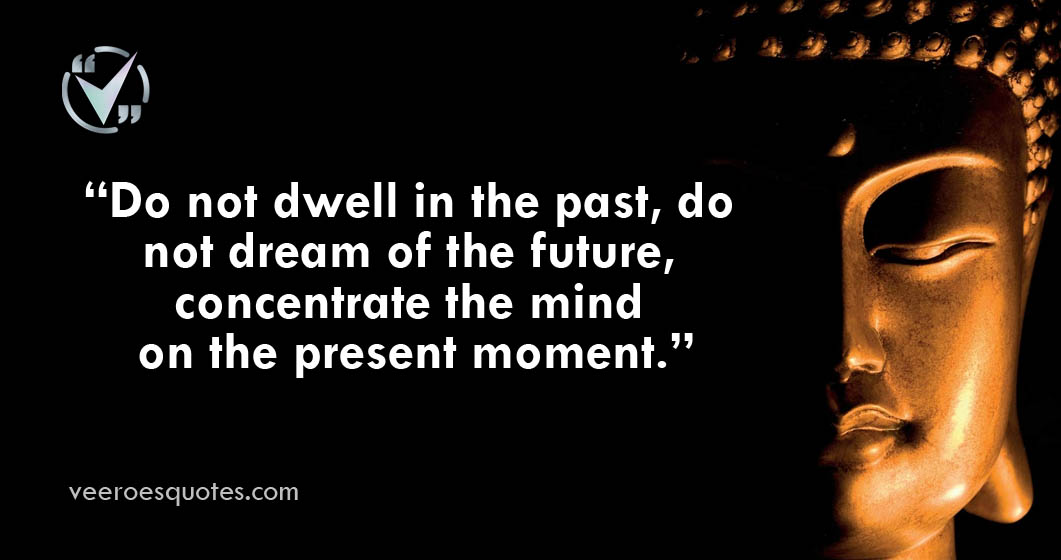“Do not dwell in the past, do not dream of the future, concentrate the mind on the present moment.”
Gautama Buddha Quotes
“Buddha” refers to “one who is awake”; hence, it is better considered a title than a mere name. The emergence of this great personality began with the birth of the Prince Siddhartha Gautama in Lumbini, Nepal, in 567 BCE. He was about 29 years old while he started his venture to become a memorable persona. It was during his realization of enlightenment when people began referring to him as “buddha”. He then devoted his entire life teaching people about peace and the truth of existence. The following are some of his quotes that he used to spread knowledge among his followers.

“It is better to travel well than to arrive.”
“It is better to conquer yourself than to win a thousand battles. Then the victory is yours. It cannot be taken from you, not by angels or by demons, heaven or hell.”
“Peace comes from within. Do not seek it without.”
“The only real failure in life is not to be true to the best one knows.”
“The way is not in the sky. The way is in the heart.”
“There is nothing more dreadful than the habit of doubt. Doubt separates people. It is a poison that disintegrates friendships and breaks up pleasant relations. It is a thorn that irritates and hurts; it is a sword that kills.”
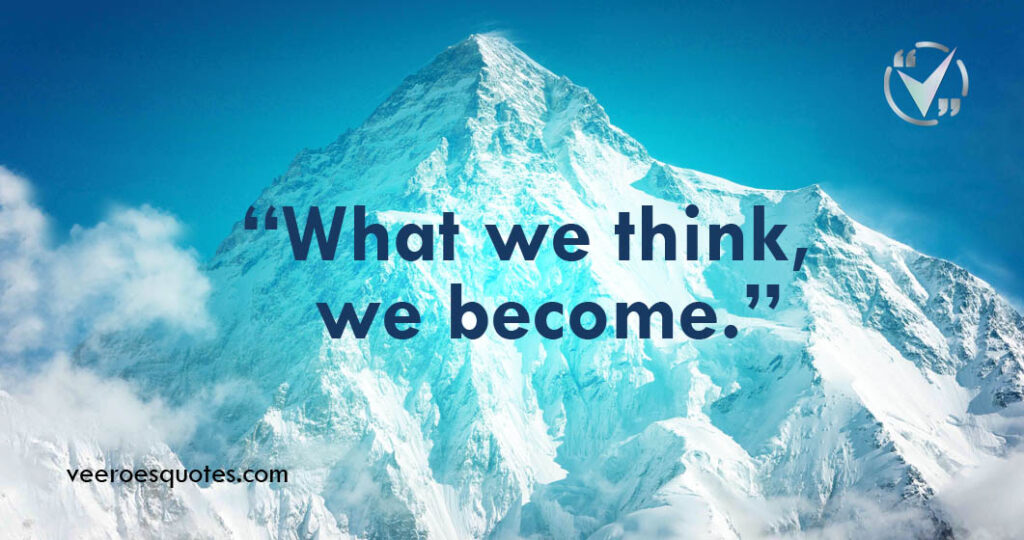
“What we think, we become.”
“Thousands of candles can be lighted from a single candle, and the life of the candle will not be shortened. Happiness never decreases by being shared.”
“We are what we think. All that we are arises with our thoughts. With our thoughts, we make the world.”
Buddha Quotes on Karma
Karma is a popular idea encountered in various eastern religions. However, the meaning varies from place to place. In Sanskrit, the literal meaning of the term is “doing” or “action.” as per Buddhists, all living beings are in control of their ultimate fates. Buddha defined karmic conditioning as a procedure through which an individual’s nature gets shaped via their actions. The following quotes help to get an in-depth idea about karma.
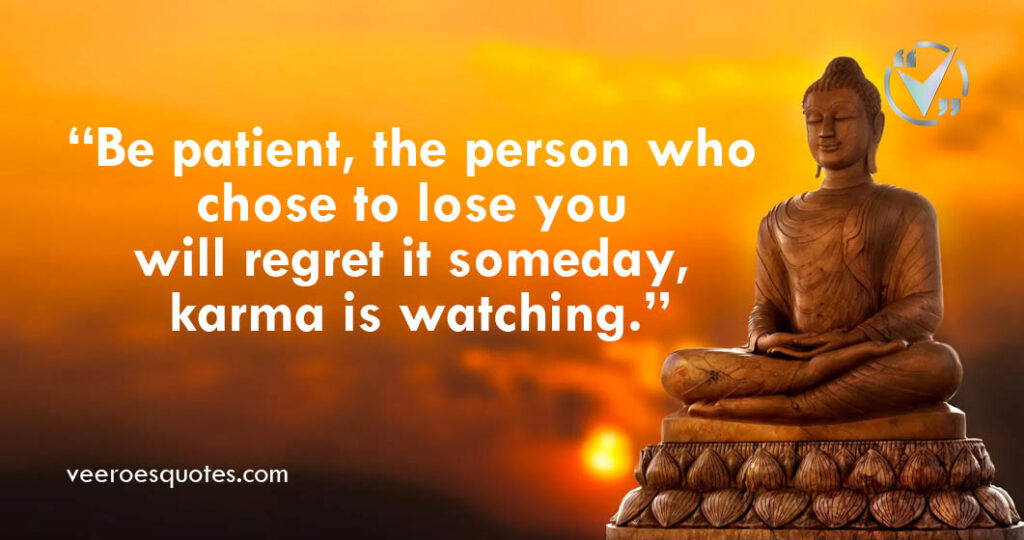
“Be patient, the person who chose to lose you will regret it someday, karma is watching.”
“Love or karma? Karma why? At least I’ll get something in return.”
“Sorry is just another way of saying you are more important than my ego.”
“Karma says you call her prostitute for being sexually explicitly engaged in payment, but what should we call that man who is paying her.”
“Make promises by temporary people, gives permanent sounds on weak heart.”
“Everything happens for a reason don’t question it, trust it.”
“Right person will love you without questioning about your past. Wait for that special person.”
“If someone really loves you, no matter how many new people they meet, their feelings for you wouldn’t change, a real lover can’t be stolen.”
“Never complain about what your parents couldn’t give you, because they give you more than what they had.”
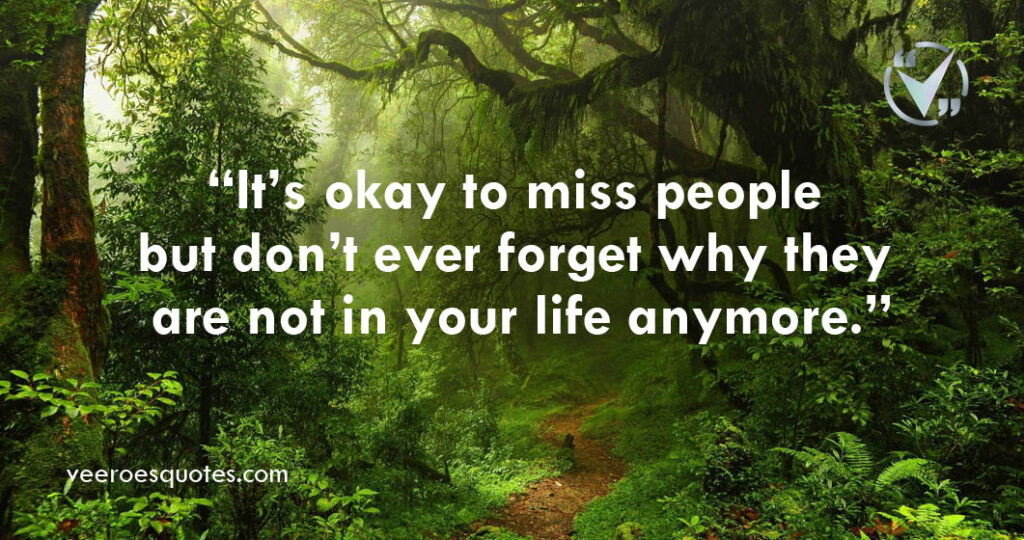
“It’s okay to miss people but don’t ever forget why they are not in your life anymore.”
“Of you break someone and they still wish you the best, you have lasted the greatest thing for you.”
“In this fake love era, it’s better to keep your feelings to yourself when your know people can’t understand.”
“80% of women use silence to express pain. You know she is truly hurt when she chooses to ignore you.”
“It’s hurt like hell when you know that you have t let go of someone. But you can’t because you are still waiting for the impossible to happen.”
Buddha Quotes on Peace
Buddhism narrated peace as an inner condition or state of mind that reflects outside. Gautama, in his several teachings, emphasized regular exercising of vipassana. This practice helps heal mental degradation, which is the leading cause of one’s restlessness and suffering. He gained peace from meditation and used the following quotes to educate others on the importance of peace:
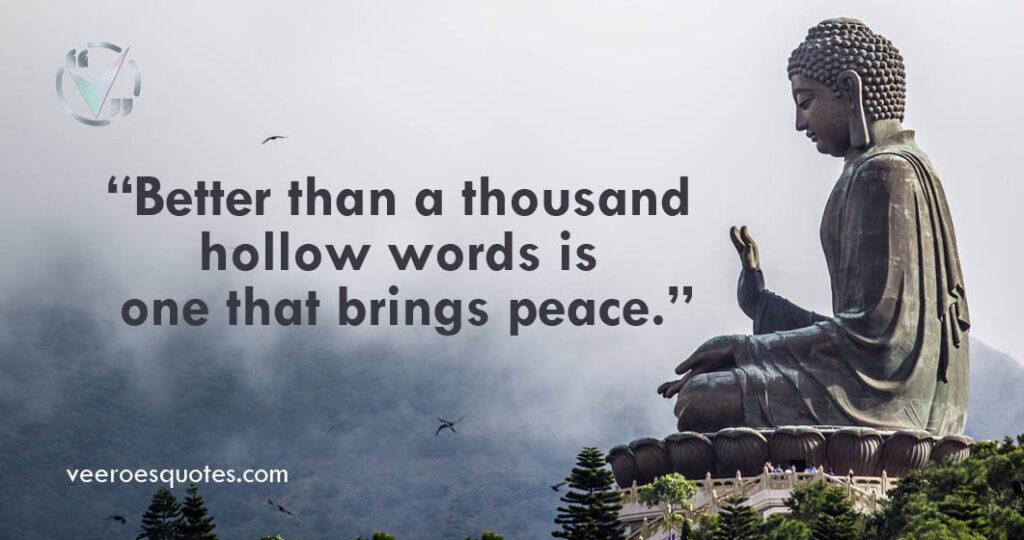
“Better than a thousand hollow words is one that brings peace.”
“All wrong-doing arises because of mind. If mind is transformed can wrong-doing remain?”
“An insincere and evil friend is more to be feared than a wild beast; a wild beast may wound your body, but an evil friend will wound your mind.”
“He is able who thinks he is able.”
“It is a man’s own mind, not his enemy or foe, that lures him to evil ways.”
“The mind is everything. What you think you become.”
“Those who are free of resentful thoughts surely find peace.”
Buddha Quotes on Happiness
The way to happiness begins from a deeper understanding of the major cause of suffering, as per the teachings of the Buddha. He can even get categorized as a skillful doctor who used compassion and wisdom to treat people’s suffering. His contemporaries even described their teacher as “ever-smiling.” one can also evidence a constant smile in all his portrayals, appearing from his more profound equanimity. Below enlisted are the quotes that can enlighten people about his idea of happiness.
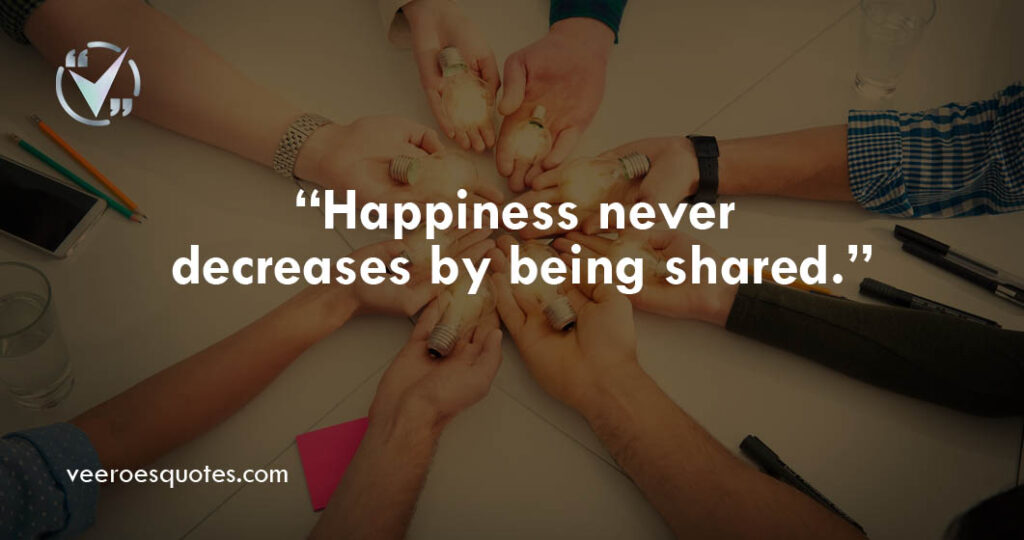
“Happiness never decreases by being shared.”
“In the end, only three things matter: how much you loved, how gently you lived, and how gracefully you let go of things not meant for you.”
“If with a pure mind a person speaks or acts happiness follows him like his never-departing shadow.”
“It is in the nature of things that joy arises in a person free from remorse.”
“Set your heart on doing good. Do it over and over again, and you will be filled with joy.”

“One who acts on truth is happy in this world and beyond.”
“All that we are is the result of what we have thought. If a man speaks or acts with an evil thought, pain follows him. If a man speaks or acts with a pure thought, happiness follows him, like a shadow that never leaves him.”
“Once you know the nature of anger and joy is empty and you let them go, you free yourself from karma.”
“You will not be punished for your anger; you will be punished by your anger.”
“Holding on to anger is like grasping a hot coal with the intent of throwing it at someone else; you are the one who gets burned.”
“Whoever doesn’t flare up at someone who’s angry wins a battle hard to win.”
“Conquer the angry one by not getting angry; conquer the wicked by goodness; conquer the stingy by generosity, and the liar by speaking the truth.”
Buddha Quotes on Suffering
It was during his first encounter with an ill man, an ascetic, an older adult, and a corpse when Siddhartha realized the existence of suffering. Suffering in Sanskrit is known as ‘duhkha,’ and in Buddhism, it is the genuine nature of the entire survival. Several Buddhist doctrines lie on the concept of agony; the cause behind it, its actual image, and the motive of suppression built the subject of Gautama’s first sermon. The following are some quotations he used to explain the pain and its consequences.

“If a man speaks or act with a good thought, happiness follows him like a shadow that never leaves him.”
“People suffer because they are caught in their views. As soon as we release those views, we are free and we don’t suffer anymore.”
“Have compassion for all beings, rich and poor alike; each has their suffering. Some suffer too much, others too little.”
“Ambition is like love, impatient both of delays and rivals.”
“Ardently do today what must be done. Who knows? Tomorrow, death comes.”
“Remembering a wrong is like carrying a burden on the mind.”
“The seed of suffering in you may be strong, but don’t wait until you have no more suffering before allowing yourself to be happy.”
“Usually when we hear or read something new, we just compare it to our own ideas. If it is the same, we accept it and say that it is correct. If it is not, we say it is incorrect. In either case, we learn nothing.”
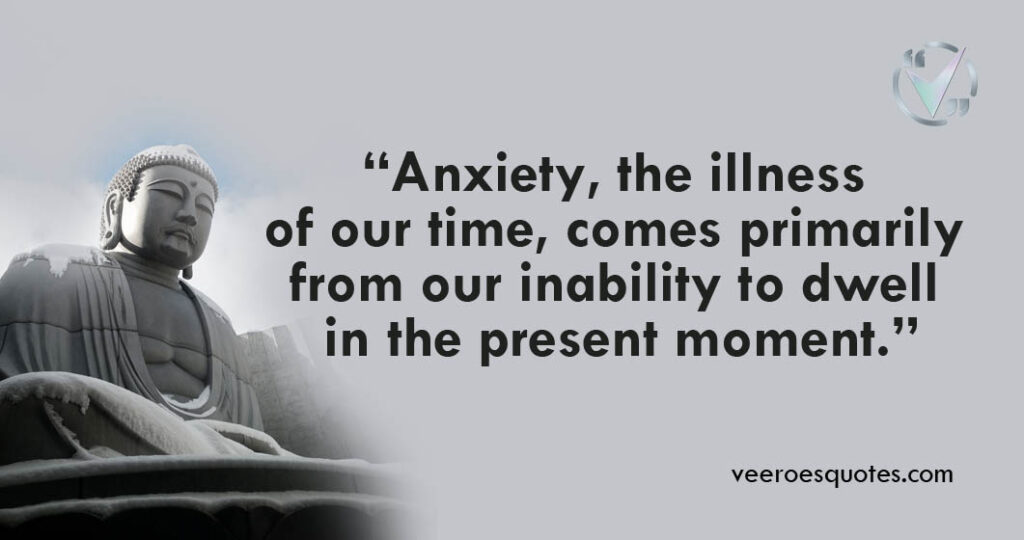
“Anxiety, the illness of our time, comes primarily from our inability to dwell in the present moment.”
“There is nothing so disobedient as an undisciplined mind, and there is nothing so obedient as a disciplined mind.”
“Pain is certain, suffering is optional.”
“The root of suffering is attachment.”
“Our life is shaped by our mind; we become what we think. Suffering follows an evil thought as the wheels of a cart follow the oxen that draws it.”
“Do not lose yourself in the past. Do not lose yourself in the future. Do not get caught in your anger, worries, or fears. Come back to the present moment, and touch life deeply. This is mindfulness”
“The secret of health for both mind and body is not to mourn for the past, nor to worry about the future, but to live the present moment wisely and earnestly.”
Buddha Quotes on Truth
The mentor of the Buddhists believed the only truth of life is woe. Everything that seems to make an individual happy can also make that person suffer at times. He used his four noble truths to describe the truth lying behind excruciation. As per his believes, it is the only way to gain a release from all those negativities and pains. Below are the quotes that describe his meaning of truth.

“The ultimate truth is not even to think.”
“In the sky, there is no distinction of east and west; people create distinctions out of their own minds and then believe them to be true.”
“There are only two mistakes one can make along the road to truth; not going all the way, and not starting.”
“Three things cannot be long hidden: the sun, the moon, and the truth.”
“Whatever words we utter should be chosen with care for people will hear them and be influenced by them for good or ill.”
Buddha Quotes on Changing Yourself
After gaining the idea of enlightenment, the once-prince understood the importance of the decisions one made in their life. He believed it is about changing the thoughts and finally oneself to help an individual get all the answers to their questions. He encouraged people to think and bring essential changes that they require and motivated them with the following quotes:
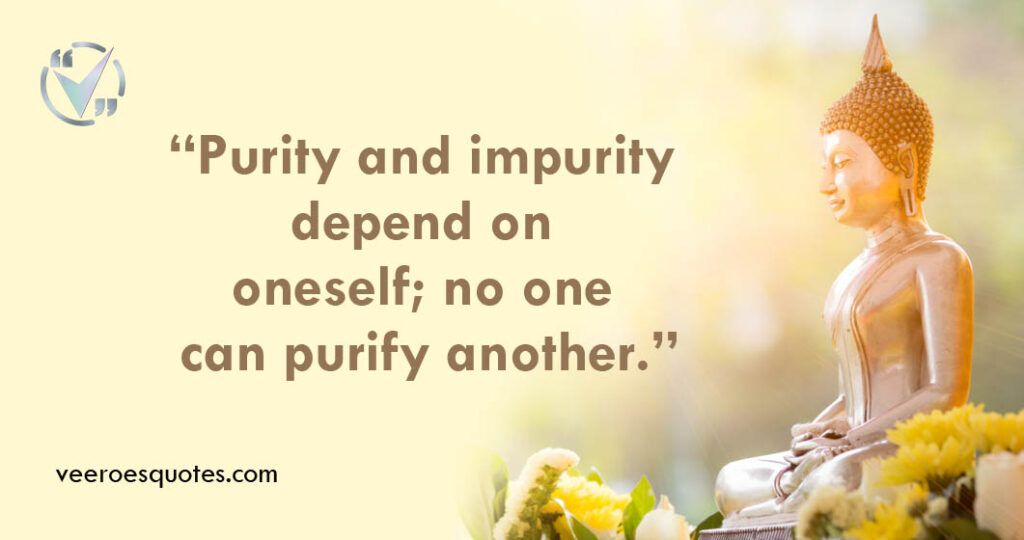
“Purity and impurity depend on oneself; no one can purify another.”
“Do not dwell on the past. Do not dream of the future. Concentrate the mind on the present moment.”
“We are shaped by our thoughts; we become what we think. When the mind is pure, joy follows like a shadow.”
“People with opinions just go around bothering each other.”
“If you find no one to support you on the spiritual path, walk alone.”
“An idea that is developed and put into action is more important than an idea that exists only as an idea.”
“The tongue like a sharp knife; it kills without drawing blood.”
“You can only lose what you cling to.”

“Endurance is one of the most difficult disciplines, but it is to the one who endures that the final victory comes.”
“As you walk and eat and travel, be where you are. Otherwise, you will miss most of your life.”
“A dog is not considered a good dog because he is a good barker. A man is not considered a good man because he is a good talker.”
“Doubt everything. Find your own light.”
“There has to be evil so that good can prove its purity above it.”
“If your compassion does not include yourself, it is incomplete.”
What are the 5 main teachings of Buddhism?
The five significant teachings include:
- The first precept must be the end of killing both animals and humans.
- The second one involves the prohibition of activities like forgery and fraud.
- The third point suggests long-term commitment and sexual responsibility.
- The fourth teaching prefers avoiding falsehood spoken.
- The fifth lesson recommends leaving intoxication or addiction.
What are the 7 Buddhist virtues?
The list of virtues are as follows:
- Paramitas (perfections)
- Dana (generosity)
- Sila (proper conduct)
- Nekkhamma (renunciation)
- Panna (wisdom)
- Viriya (energy)
- Sacca (honesty)
What are the 3 central Buddhist beliefs?
The three central beliefs in Buddhist are:
- The three universal truths
- The four universal truths
- The noble eightfold path
What did Buddha say about God?
Buddha resided at a time when the presence of God was believed to be the only and the most considerable truth. However, there is no such belief in any personal god in Buddhism. They were convinced, nothing ever is permanent or fixed. Change is the way of life and is always possible. Although the master himself neither denied nor accepted the theory of supreme being. He invested most of his time and guided his students to follow their truth and inner self.
What is a sin in Buddhism?
Buddhists never believed in the existence of original sin or even the idea of sin. There are no such connotations made in their teachings on sin specifically. Since they do not rely on or accept the fact of God, the word sin, papa, or apunna denotes the evil elements, which distracts the mind. It even leaves a deadening impact on the psyche of an individual that makes their upliftment more difficult.
What is the main symbol of Buddhism?
Generally, there is a total of eight symbols with specific meanings in Buddhism. However, the main and the most iconic mark they have is the ‘dharma wheel.’ the dharma wheel, also referred to as the ‘dharma chakra,’ is one of the oldest images that delivers eight ideals. These ideals include right understanding, right intention, right speech, right action, right livelihood, right effort, right mindfulness, and right concentration. The wheel, however, later became one of the renowned Indian signs used for protection, sovereignty, and power.
What is the goal of Buddhism?
The eventual goal of these principles is to release oneself from the cycle of phenomenal existence along with its eternal suffering and gain ‘nirvana.’ the term generally means “quenching” or “blowing out.” the purpose is to get detached from quenchless desires and effortlessness while recognizing happiness’s subjective and elusive characteristics. Two types of nirvana – sopadhishesa-nirvana and anupadhishesa-nirvana or parinirvana, and buddha successfully reached both states.
What is the human problem in Buddhism?
According to Gautama, one standard and significant problem humans undergo is suffering, which hides much deeper. Human beings get attracted to cravings and desires. But even after fulfilling those desires, it provides them with temporary satisfaction, opening another path for new suffering and unsatisfaction. This sense of negativity and never-ending desires becomes the root cause and is the primary human issue.
How do Buddhist ideals still affect our life?
The ideals introduced long ago by knowledgeable figures still have a major impact on people’s life. The principles of personal purification, equality, and lessons of non-violence can still get noticed, and people are trying to practice and improvise them more to bring changes in society. When there is a dire need for positivity and inner happiness, it is their long-ago ideals and teachings that people try to inculcate among themselves to stay calm, have patience, and enjoy their lives.
What does the lotus flower mean in Buddhism?
Among the eight signs, the lotus flower is one of the remarkable Buddhist symbolism. It represents the purity of mind, body, and speech, just like floating above the muddy waters of physical and materialistic desires. In their art, there are two types of flowers that have two different meanings. A fully bloomed lotus refers to enlightenment, while a closed bud flower signifies the period before that awareness or knowledge. The mention of lotus begins with prince Siddhartha’s first steps right after his birth. As per old tales, several of those flowers began to bloom everywhere the prince stepped.
Endnotes
One prevalent fact about Buddhism and the guidance of Buddha is that it is not a belief, instead, it is a practice. In today’s world where finding a person with a good heart and full of kindness has become so challenging, this exercise can help people to become one such individual whom they seek into other. According to the earlier texts, right after the master recognized dhyana or meditation as the correct way to awake. However, his later realization told him that it failed to reach his goal. Later, while he remembered his early memories with his father and their meditative experience, it was then when he happened to gain all four dhyanas.
During his first attempt, he noticed that the substantial truth and knowledge lies not under great mysteries; instead, it’s hidden in the minor things and every emotion a human feel. No one has to reach the levels of that supreme idol to understand what enlightenment is. They only need to go deeper into themselves and understand their inner selves and find their awareness, leading them towards nirvana. There is an existence of truth and happiness residing inside of every being; all one needs to do is find them with patience, kindness, compassion, and honesty. The more one understands themselves, the more an individual becomes capable of acknowledging the nature of its surrounding.

